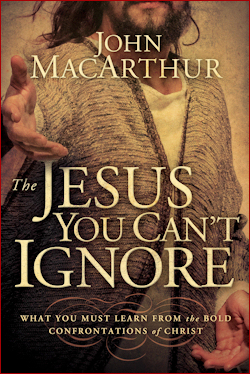
|

 enerally speaking, avoiding conflicts is a good idea. Warmth and congeniality are normally preferable to cold harshness. Civility, compassion, and good manners are in short supply these days, and we ought to have more of them. Gentleness, a soft answer, and a kind word usually go further than an argument or a rebuke. That which edifies is more helpful and more fruitful in the long run than criticism. Cultivating friends is more pleasant and more profitable than crusading against enemies. And it's ordinarily better to be tender and mild rather than curt or combative—especially to the victims of false teaching.
enerally speaking, avoiding conflicts is a good idea. Warmth and congeniality are normally preferable to cold harshness. Civility, compassion, and good manners are in short supply these days, and we ought to have more of them. Gentleness, a soft answer, and a kind word usually go further than an argument or a rebuke. That which edifies is more helpful and more fruitful in the long run than criticism. Cultivating friends is more pleasant and more profitable than crusading against enemies. And it's ordinarily better to be tender and mild rather than curt or combative—especially to the victims of false teaching.But those qualifying words are vital: usually, ordinarily, generally. Avoiding conflict is not always the right thing. Sometimes it is downright sinful. Particularly in times like these, when almost no error is deemed too serious to be excluded from the evangelical conversation, and while the Lord's flock is being infiltrated by wolves dressed like prophets, declaring visions of peace when there is no peace (cf. Ezekiel 13:16).
Even the kindest, gentlest shepherd sometimes needs to throw rocks at the wolves who come in sheep's clothing.
Was Jesus Always "Nice?"
The Great Shepherd Himself was never far from open controversy with the most conspicuously religious inhabitants in all of Israel. Almost every chapter of the gospels makes some reference to His running battle with the chief hypocrites of His day, and He made no effort whatsoever to be winsome in His encounters with them. He did not invite them to dialogue or engage in a friendly exchange of ideas.
Jesus' public ministry was barely underway when He invaded what they thought was their turf—the temple grounds in Jerusalem—and went on a righteous rampage against their mercenary control of Israel's worship. He did the same thing again during the final week before His crucifixion, immediately after His triumphal entry into the city. One of His last major public discourses was the solemn pronunciation of seven woes against the scribes and Pharisees. These were formal curses He pronounced against them. That sermon was the furthest thing from a friendly dialogue. Matthew's record of it fills an entire chapter (Matthew 23), and as noted earlier, it is entirely devoid of any positive or encouraging word for the Pharisees and their followers. Luke distills and summarizes the entire message in three short verses—Luke 20:45-47: "Then, in the hearing of all the people, He said to His disciples, 'Beware of the scribes, who desire to go around in long robes, love greetings in the marketplaces, the best seats in the synagogues, and the best places at feasts, who devour widows' houses, and for a pretense make long prayers. These will receive greater condemnation.'"
That is a perfect summary of Jesus' dealings with the Pharisees. It is a blistering denunciation—a candid diatribe about the seriousness of their error. There is no conversation, no collegiality, no dialogue, and no cooperation. Only confrontation, condemnation, and (as Matthew records) curses against them.

Jesus' compassion is certainly evident in two facts that bracket this declamation. First, Luke says that as He drew near the city and observed its full panorama for this final time, He paused and wept over it (Luke 19:41-44). And second, Matthew records a similar lament at the end of the seven woes (Matthew 23:37). So we can be absolutely certain that as Jesus delivered this diatribe, His heart was full compassion.
Yet that compassion is directed at the victims of the false teaching, not the false teachers themselves. There is no hint of sympathy, no proposal of clemency, no trace of kindness, no effort on Jesus' part to be "nice" toward the Pharisees. Indeed, with these words Jesus formally and resoundingly pronounced their doom and then held them up publicly as a warning to others.
This is the polar opposite of any invitation to dialogue. He doesn't say, "They're basically good guys. They have pious intentions. They have some valid spiritual insights. Let's have a conversation with them." Instead, He says, "Keep your distance. Be on guard against their lifestyle and their influence. Follow them, and you are headed for the same condemnation as them."
This approach would surely have earned Jesus an resounding outpouring of loud disapproval from today's guardians of evangelical protocol. In fact, His approach to the Pharisees utterly debunks the cardinal points of conventional wisdom among modern and postmodern evangelicals—the neo-evangelical fondness for eternal collegiality, and the Emerging infatuation with engaging all points of view in endless conversation. By today's standards, Jesus words about the Pharisees and His treatment of them are breathtakingly severe.












19 comments:
As you can imagine, there is room for all kinds of abuse of this kind of approach.
I've seen some people "rebuke" just about everything. No discernment, just a nagging finger at the most picayune matters. You know the type of fundamentalist I'm talking about.
So who does the rebuking? Is this a model for the Shepherds only? And when should they take this approach?
Zaphon
Nice excerpt.
Pastor MacArthur always seems to deal well with false teachers. Always very balanced.
When we do confront a false teacher, say like Brian McLaren, then these sometimes turn a teaching like John MacArthur's back on us, and we are the Pharisees, while he is the disciple of Christ.
They are the nice and gentle good guys, and we are the mean stuffed shirt bad guys.
I would have to think Christ, when He wept, was sad over Jerusalem, which would include the priests, scribes, Pharisees, all the Jews really.
Paul said he wished he could be accursed for these same people, and that he wept for the enemies of the Cross (Phil. 3:18).
Paul also said, "Let them be accursed, even himself, if a fals egospel is being taught.
Wow, that is a great excerpt. It's also an encouragement since so often the tables are turned on us and we are portrayed as the bad guys for having the audacity to speak out against false teaching. Thanks for sharing. I cannot wait to read the book.
After reading the WashPost article and Christian Post interview yesterday and this post today, the book is definitely on my list to read.
Surprisingly, I ordered this book last week, before the WashPost article. I'm racing through it and cannot recommend it enough. A true breath of fresh air.
Would that we all remember that we hold a sword, rather than a butter knife, in our hand.
I downloaded the Kindle edition …hopefully I’ll get to read it before it’s deemed harmful by the state and it disappears.
This approach would surely have earned Jesus an resounding outpouring of loud disapproval from today's guardians of evangelical protocol....By today's standards, Jesus words about the Pharisees and His treatment of them are breathtakingly severe.
He would still be called Beelzebul; He would still be hated without a cause; and He would still be crucified by the religious establishment.
And of course He would be called a Pharisee.
I agree with you Phil.
I think this book is the best he has written. And that's saying something since he has written some very excellent books in the past!
Zaphon,
This is the reason that Screwtape tells Wormwood to move in the direction of the times, and why we need to preach against the flow. If today's church were dominated by rebukers, the Christlike course would be to drive it back toward peacemaking and charity. Right now, that's not much of a problem, and we could use some more finger waggers.
As humans, we're always heading for the ditch on one side of the road or the other. Right now, we need to swerve out of the one on the left-hand side. Our grandkids will probably need to pull us out of the right-hand one.
Don Sands: "When we do confront a false teacher, say like Brian McLaren, then these sometimes turn a teaching like John MacArthur's back on us, and we are the Pharisees, while he is the disciple of Christ."
I have observed and said the same thing in the past.
When you have two sides calling each other Pharisees, who is the unbelieving, undiscerning 3rd-Party bystander going to side with, assuming s/he sides with anyone?
They will usually side with the more popular, more attractive, more liberal person. That is why I use the terms "Liberal Pharisee" or "Left-wing Legalist".
GREAT excerpt! Yes, it leaves a lot of questions unanswered:
1) Who is to do the rebuking?
2) How do we deomstrate who is the Pharisee, and who isn't?
3)How do we know we are supposed to do the same as Jesus, since he's Jesus and we aren't?
etc.
BUT... that's because it's an excerpt, not the whole book.
Mr. McA. is off to a very good start with this one. Kudos.
Thanks to Dr. MacArthur for telling the truth. It is not easy to find truth these days. Many false teachers are welcomed with open arms by American 'Christians' while the Bible is not welcomed.
Sure, there is much out-of-context talk about grace but not much talk about the full spectrum of God's truth.
Zaphon asked who should do the rebuking. All Christians have the responsibilty to affirm God's word in its entirety and to avoid and expose false teachers.
There will be a cost for standing up for the truth. There will be a greater cost for taking the broad road, however...
www.truthinator.wordpress.com
A detailed and Biblically comprehensive answer to the silliness of “they like Jesus but not the church/ religion/ rules/ repentance/ submission arguments is a welcome sight.
Sadly, this book will probably not change a lot of minds, as the only people who will rush to get it, comprise the choir. But at least we can be encouraged not to accept the persistent argument to compromise in the name of evangelic love.
If we are on the side of Truth, we will not be loved by the world. That is ok, as long as we remain loved by God.
Zaphon asked
So who does the rebuking? Is this a model for the Shepherds only? And when should they take this approach?
Disciples of Christ do the rebuking, and of course not in arrogance and abuse, that is a different sin also requiring repentance.
And the primary focus is teachers; we need to do a much better job of teacher accountability.
Mike: "And the primary focus is teachers; we need to do a much better job of teacher accountability."
Online discernment ministries?
i suppose we could just nuke em from space, that is the only way to be sure:)
actually i think it works better for it to be done (where is Frank?) in the local churches, and within the assemblies.
of course, the online public proclaimers can pretty much only be addressed in public online, as there does not seem to be any avenue of accountability.
probably why Dan is so adament about us primarily getting our teaching from our pastors, or something like that.
This particular site, along with Dan's and Frank's, offer us an invaluable amount of information in the discernment and truth areas. I know that I can be susceptible to checking things out and then while being exuberantly self congratulatory regarding my tingling spidey senses, not actually following through and attempting to approach the brother who said or did whatever caused the search for truth.
I have been a bit more outgoing with my concerns, and it appears to have the unexpected benefit of reducing the expected postage for Christmas cards this year, and I have a lot more uninterrupted after church lunches with the Mrs. So it isn’t all bad
:)
I had to laugh when I saw two of the labels at the end of this post:
Labels: "tone", merciless beatings
Those are interesting blog subjects :-)
MacArthur's words in this post are absolutely vital for the "evangelical" church to hear these days. It should be thundered loudly in that broader context. However, I have to admit that I think the opposite needs to be emphasized among the doctrinally orthodox evangelical [and Calvinistic] bloggers. They may be "discerning" and "bold" enough to speak against error and heresy, but they generally seem to lack the temper of Christ's patience, gentleness and sincere care for the well-being of other people when they interact with them through this medium.
True, one must be strong to faithfully stand against the doctrinal spinelessness and the tyranny of the "nice" in our culture, but one must be even stronger to remain patient and loving towards those we deem to be our enemies. Christ only spoke anathemas against the Pharisees after they rejected his offers of mercy and after they were hindering others from coming to him for grace and forgiveness. And, even after this, he still sent his apostles to the Jerusalem sinners who played a part in murdering him, so that they might again perceive the power of his patience and receive the offered grace. Bunyan, Grosvenor and Davies all have excellent sermons that make the point.
Really that is a great excerpt. the book is definitely on my list to read.
___________________
Andrew
Low and best rates on Payday Loans
Post a Comment